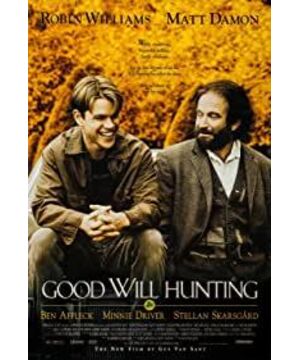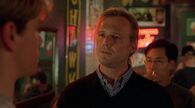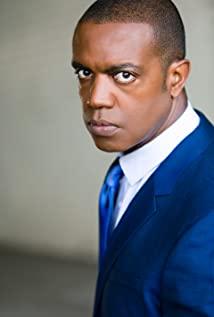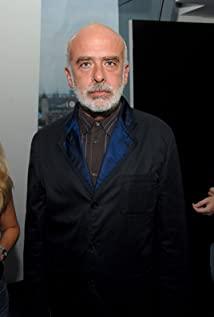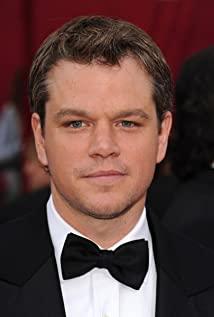In 1986 Beijing Workers' Sports, a 25-year-old youth was wearing a long coat, carrying a broken guitar, and his trousers were one high and one low. The music started, and the song "I used to ask endlessly" sounded. 10 minutes, an era. Twenty years later, Chinese rock is still living in the era of "nothing" by Cui Jian.
It's okay to be melancholy and frivolous. In the eyes of all young people, a hundred years of life means the world is only a hundred years old. For young people with extraordinary talents, because of a hundred years of life, the world is only a hundred years old.
In the film, Will Hunting lacks a prominent educational experience, but is proficient in mathematics, chemistry, history, art and all areas of interest to him. Regardless of whether it is possible in reality or not, in terms of screen image, it has given people a great impact. Easily solve the Fields Medal winner's puzzle, clearly remember which page of which book a certain idea came from, grasp organic chemistry problems at your fingertips, and even master Monet and Van Gogh's pen. So, the track is nearly complete.
However, the capital Will used to fight and even despise the world collapsed after a passage from Shawn: "If I asked you about art, you would probably tell me about Michelangino's life, his fortunes, his ambitions and all his works— But you've never been to the Sistine Chapel, you haven't looked up at the beautiful frescoes on the ceiling.
If I asked you about wars, you'd tell me their causes and consequences, even common people don't know, but you've never experienced them War, you never put your friend's head on your knee and watch the bullet take his life.
If I asked you about love you might read me a poem, but you never experienced love, you Never been vulnerable in front of a pair of beautiful eyes... You never love someone more than yourself.
How much do you know about me? Just like I know you are an orphan, I can't rely on watching "Oliver Twist" Just as if you know you know yourself, you can't just rely on a picture to think you know me.
So in my eyes you are just a child, no matter how much you know, you are just a child. Because you never feel or listen , you have never loved anyone."
Youth and talent can certainly form a full understanding of the world, but this intellectual cognition has no personal experience as the cornerstone. As Bertrand Russell said, experience without learning is better than learning without experience. Thinking of this, Will's psychological defense completely collapsed. However, it is also because of his youth that Shawn's touching "It's not your fault" and Will's final choice were made several times in succession.
From self-imposed success to failure, and then from failure to real success, all the themes of the film are mentioned. This theme is about youth. Success does not depend on how many achievements or talents you have, but how much you know yourself.
Will finally emerges from his abused childhood, finds out what he really wants, and embarks on a journey to find his soul mate. In the process, Shawn, as a psychological mentor, just helped Will do a job and get to know himself. The clearer the understanding of oneself, the more profound the understanding of the world. This good mantra, revealed by Shawn, applies to every young life.
The part about personality structure in Freud's psychoanalytic theory may be used as a solution to Will, that is, convenience is more reflected in Will's self-protection and rejection of the external world. Will at the id level pursues simple pleasures, attacking the police, clubbing, and even throwing fists at each other when he disagrees or encounters a childhood "enemy". Seemingly happy and enmity, in fact, he is seeking an outlet for the unbearable childhood experience.
Will on the ego level knows exactly where his interests lie. As a cleaner, he would forget to sleep and eat for mathematical problems in higher education institutions; in the face of invitations from the National Security Agency, he could also arrange friends to go there at will, which shows that he has a very clear awareness of himself. Or as Freud said: "Where the id was in the past, the ego should be there." Will's rational choice actually cannot get rid of its emotional and impulsive shadow. In fact, there is still unconsciousness in all kinds of clear self-knowledge, which makes it start to escape, isolates itself from the world, and dares not face its own heart.
With the help of Shawn, Will gradually discovers his superego, and has a clearer understanding of the ethical principles and life values he intends to follow in his subconscious mind. The mathematics professor bails Will, introduces him to work, and solves mathematical problems together. Will is just a nut under the umbrella of his instrumental rationality. Shawn and Will quarreled, had a cold war, and even embraced and cried, and Will was just a friend. When Will recognized the difference between the two values, a clear path quietly emerged. In this sense, the film provides a vivid interpretation of Freud's theory of personality composition through the interconnectedness of the three protagonists. In the end, in Will, the id, ego and superego reached a balance, achieving the "Good Will Hunting" implied in the title, which is not only a compliment to the protagonist, but also a theoretical confirmation of the theme.
Another interesting detail in the film concerns methodology. Before Shawn appeared, both psychological interviews and hypnotherapy were dispelled by the intelligent Will. This is not a flaw in the method itself, but a difference in purpose. In the eyes of the first two doctors, Will was only a patient with special conditions, but in Shawn's case, he became a close child. Will and Shawn had eight face-to-face encounters, and the process was quite entertaining.
The first time they met was in Shawn's office, with dim lights and scattered documents. Until the camera focuses on Shawn's painting, causing an argument. Although Shawn was furious, he wanted to help the child.
So there was a second meeting. Lakeside, Autumn Tree, Dusk, Shawn deliberately chose an open environment, or it also coincides with the theory of "empathy" in psychology. After Shawn's long monologue on the difference between knowledge and experience, Will begins to feel terrified of what he has learned from his past. For the third meeting, Shawn chose to remain silent, waiting for Will to speak first. The camera kept switching between the clock and Will's entangled fingers, and anxiety arose spontaneously. On the fourth meeting, the two started with a joke and slowly talked about their shared experiences. And for the fifth time, Shawn offered encouragement to Will by recounting his bizarre feelings. After the sixth and seventh time, Shawn began to take the initiative to stimulate Will with his personal experience, forcing Will to face the past that he didn't want to face. The camera cuts, when Will's mood reaches the top of the slope, Shawn begins to comfort him with a continuous "it's not your fault". And this scene touched many people.
Shawn used a lot of empathy methods, even implied the principle of "field theory" in Gestalt psychology, and broke through Will's psychological defense line by comparing his heart with his heart. And the success of this communication does not depend on the means employed, but on the motives. It is not difficult to see that the title of "Soul Catcher" is not only a literal translation of Will's name, but also a compliment to Shawn.
Will finally embarked on the path of his choice, and the compromise and persistence in the process were still real. At the end of the story, the car goes north, the sun sets in one place, and the road music plays, a typical American movie. Forever young, always full of tears, just like another translation of the movie: "The sun is like me". Will's choice not only engraves the shadow of psychology, but also interprets a principle: the more thorough the pursuit of self, the more profound the world will be.
It is also a once young and flamboyant life, the poet Keats, but left such an epitaph: Here lies one whose name was writ in water.
Morning bells and twilight drums, dashes of youth, will eventually be linked into traces of memories in the pursuit. And the main point of this journey is nothing more than a few lines of words engraved on the lintel of the Temple of Apollo by the Greek ancestors: Know yourself.
View more about Good Will Hunting reviews


